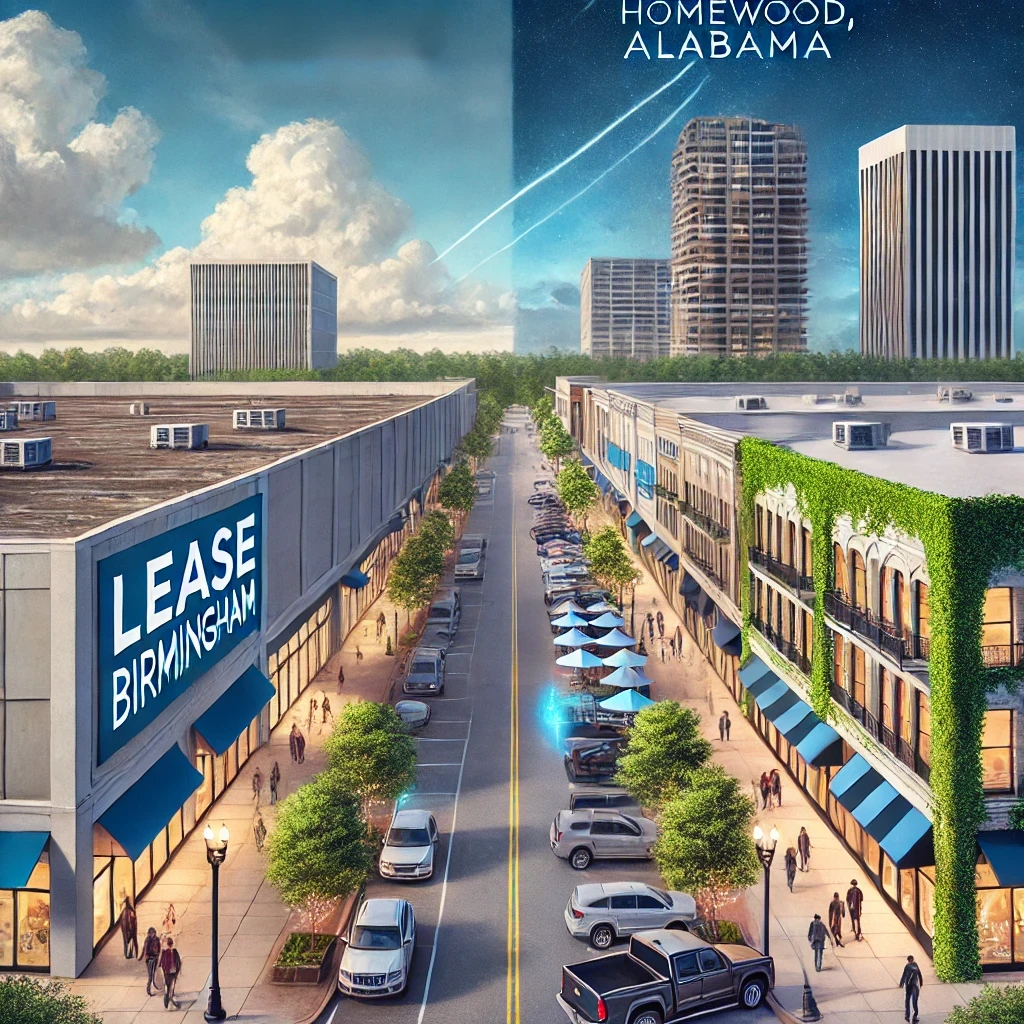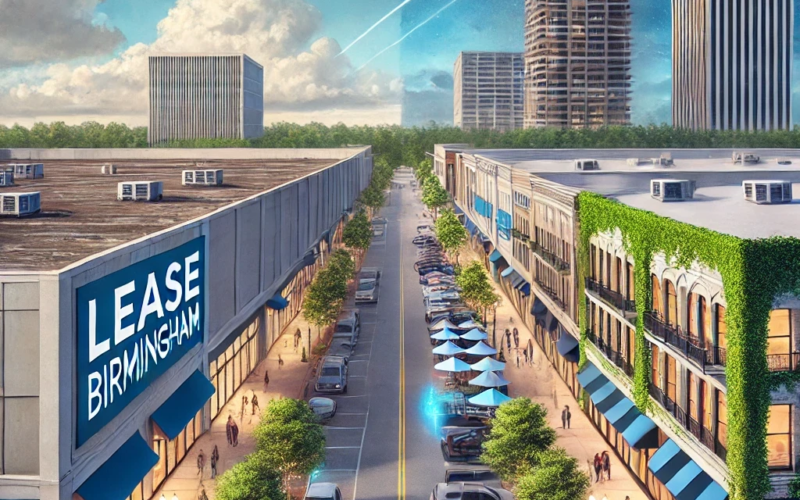The Brookwood Village Mall Closure Drives New Demand for Commercial Real Estate in Homewood, Alabama
Introduction
The closure of Brookwood Village Mall marks a significant shift in the commercial landscape of Homewood, Alabama. Once a bustling retail destination, the mall struggled for years due to shifting consumer preferences, the rise of e-commerce, and changes in the retail industry. As national retailers downsized their brick-and-mortar presence, foot traffic declined, leading to vacancies that ultimately sealed the mall’s fate. Now, with its doors permanently shut, businesses that once depended on its high visibility and customer flow must seek new locations, altering the dynamics of commercial real estate in Homewood.
This shift has ignited an increased demand for commercial properties in Homewood, as retailers, restaurants, and service providers compete for prime locations that can sustain their operations. With its walkable neighborhoods, thriving independent business scene, and strong consumer base, Homewood has become a top destination for commercial tenants seeking to capture local and regional shoppers. The area’s ability to attract new business is fueled by its proximity to Birmingham, its affluent residential communities, and the continued preference for vibrant, mixed-use districts over traditional mall environments.
Several factors are driving businesses to expand or relocate within Homewood. Accessibility is a crucial advantage, with major roadways such as U.S. Highway 31 and Interstate 65 providing seamless connections to Birmingham and surrounding cities. The area’s demographic profile is another draw, with a mix of young professionals, families, and long-time residents contributing to a stable and affluent customer base. Additionally, Homewood’s reputation for fostering a strong small-business culture, combined with local government initiatives aimed at supporting commercial growth, has made it an attractive option for companies looking for sustainable, long-term locations. As a result, the commercial real estate market in Homewood is undergoing a transformation, creating opportunities for investors, landlords, and business owners to capitalize on the changing retail and office space demands.
The Economic Impact of Brookwood Village Mall’s Closure
The closure of Brookwood Village Mall has disrupted the economic landscape of Homewood and its surrounding communities, affecting both small businesses and larger retailers that once relied on its steady stream of shoppers. With the mall no longer serving as a central shopping hub, numerous businesses have been forced to relocate or shut down, leading to commercial vacancies and financial strain on property owners. The loss of foot traffic has had a ripple effect on nearby establishments, including restaurants, service providers, and specialty shops that once benefited from the mall’s draw. Without a major retail anchor in place, the distribution of consumer spending has shifted, leaving a gap in revenue generation for businesses that previously thrived in and around the mall’s perimeter.
Job losses have been a major consequence of the mall’s closure, impacting a broad spectrum of employees, from retail associates and restaurant staff to maintenance crews and mall management professionals. Many of these workers, who depended on the steady employment opportunities the mall provided, are now seeking jobs in other retail corridors or entirely different industries. This has placed added pressure on Homewood’s local job market, where businesses in growth sectors, such as hospitality and professional services, must accommodate a workforce transitioning from traditional retail roles. The absence of a large commercial employer like Brookwood Village has also reduced tax revenue for the city, prompting a need for new businesses to fill the economic void left behind.
Consumer behavior has also evolved as a result of Brookwood Village’s closure, with spending patterns shifting toward Homewood’s walkable retail districts, online shopping, and alternative commercial centers. Shoppers who previously frequented the mall for department stores and chain retailers are now gravitating toward mixed-use developments, boutique shopping districts, and experiential retail environments that offer dining, entertainment, and unique storefronts in one location. As consumer preferences lean toward convenience, accessibility, and vibrant retail experiences, Homewood’s commercial real estate market is undergoing a transformation to meet the demand for modern, adaptable spaces that cater to evolving shopping habits. This shift has created opportunities for property owners and developers to reimagine Homewood’s retail landscape, accommodating the new wave of businesses looking to capitalize on changing consumer trends.
The Rise in Demand for Commercial Real Estate in Homewood
The closure of Brookwood Village Mall has created a surge in demand for commercial real estate in Homewood, drawing interest from businesses searching for new retail, office, and mixed-use spaces. As national retailers exit traditional shopping centers in favor of high-foot-traffic locations and flexible leasing options, Homewood has become a prime destination for businesses looking to establish a presence in an economically stable and growing market. With the mall no longer a viable retail hub, businesses that once operated within its walls are seeking alternative locations that offer greater visibility and sustained customer engagement.
Homewood’s commercial districts are adapting to this influx of demand by repurposing existing spaces and developing new commercial properties that accommodate a variety of business needs. Developers and property owners are investing in the revitalization of older structures, transforming vacant or underutilized buildings into modern retail spaces and professional offices. Additionally, mixed-use developments have gained popularity, offering businesses the opportunity to operate in environments where residential and retail spaces coexist, fostering a built-in customer base. As interest continues to grow, property values in Homewood’s key business districts have risen, making commercial leasing a competitive process for new entrants seeking prime locations.
Homewood’s Strategic Location and Accessibility
One of the primary reasons Homewood has become a focal point for commercial real estate demand is its strategic location. Situated just minutes from downtown Birmingham, the city provides businesses with access to a large metropolitan customer base while maintaining a distinct identity separate from the urban core. Its proximity to affluent residential communities, including Mountain Brook and Vestavia Hills, makes it an attractive choice for retailers and service providers seeking to cater to high-income consumers who prefer shopping and dining in locally centered environments rather than large-scale malls or corporate retail centers.
The city’s transportation infrastructure plays a crucial role in its commercial appeal. Homewood is well-connected through major roadways such as U.S. Highway 31, Lakeshore Drive, and Interstate 65, making it easily accessible to commuters, shoppers, and business clients traveling from surrounding areas. Public transportation options further enhance its accessibility, offering convenient transit for employees working in Homewood’s expanding business districts. These transportation advantages contribute to the city’s reputation as a business-friendly location, where customers and professionals can travel with ease.
The commuter patterns within the region also support business growth in Homewood. Many professionals who work in Birmingham’s central business district choose to live in Homewood due to its residential appeal, creating a consistent demand for retail, dining, and essential services within the city. Additionally, as remote work arrangements have become more prevalent, professionals are seeking office spaces closer to home, further driving demand for commercial leasing opportunities in Homewood.
Key Business Sectors Benefiting from the Real Estate Demand
Several industries are actively expanding their presence in Homewood due to the increasing availability of prime commercial space. Retail businesses, particularly independent boutiques and specialty stores, have been among the first to capitalize on Homewood’s evolving commercial real estate landscape. These retailers are drawn to the city’s walkable shopping districts and vibrant local economy, which foster a strong customer base for niche and high-end shopping experiences. With national retailers scaling back their brick-and-mortar operations, independent brands and regional businesses have an opportunity to thrive in Homewood’s retail scene.
Restaurants and hospitality businesses are also benefiting from the increased demand for commercial properties. Homewood has long been known for its diverse dining options, and as more businesses relocate to the area, the need for additional restaurants, coffee shops, and entertainment venues has grown. Local and national restaurateurs are targeting Homewood as a prime location for new establishments, capitalizing on the city’s reputation as a dining destination for residents and visitors alike.
Beyond retail and dining, service-based industries are expanding their footprint in Homewood’s commercial districts. Businesses such as medical offices, wellness centers, financial service providers, and legal firms are securing office space to serve the growing local population. These professional services are finding success in Homewood’s business environment, where clients appreciate the convenience of locally accessible services without the need to travel into Birmingham’s downtown core.
Office Space and Corporate Relocations
The demand for office space in Homewood has risen as businesses reassess their leasing strategies in response to evolving work trends. The shift away from large corporate headquarters in downtown Birmingham has led companies to seek smaller, more flexible office spaces in suburban markets like Homewood. Businesses are prioritizing locations that offer cost-effective leasing options, easy access for employees, and proximity to amenities such as dining, retail, and residential neighborhoods.
As an alternative to downtown Birmingham, Homewood provides professional firms and corporate offices with a desirable business environment that blends urban accessibility with suburban convenience. Legal firms, marketing agencies, financial institutions, and technology companies have taken an interest in Homewood’s available office spaces, particularly in areas that offer high visibility and strong community engagement. The move toward hybrid work models has also contributed to the demand, as businesses look for offices that support collaboration while allowing employees the flexibility to work remotely part of the time.
With commercial landlords adapting to these shifts, new developments and office renovations are being designed to meet the needs of modern businesses. Many office spaces in Homewood now feature open floor plans, shared workspaces, and adaptable leasing structures that accommodate businesses of varying sizes. This trend is expected to continue as more companies recognize the benefits of locating in Homewood, where they can maintain a professional presence in a thriving business district while avoiding the high rental costs associated with downtown Birmingham.
The Role of Mixed-Use Developments in Homewood’s Growth
Homewood has experienced a growing demand for mixed-use developments as businesses and residents alike seek spaces that combine retail, office, and residential uses. The closure of Brookwood Village Mall has accelerated this trend, leading developers to repurpose vacant and underutilized spaces into modern, multi-functional properties that align with today’s evolving real estate needs. These developments provide an efficient use of land while fostering a vibrant economic environment where businesses, service providers, and residents coexist in a single, well-planned community.
One of the most significant advantages of mixed-use developments is their ability to create a self-sustaining ecosystem of commerce and living space. By integrating storefronts, office spaces, and residential units into a single development, property owners enhance the appeal of their locations while ensuring steady foot traffic for commercial tenants. Developers in Homewood are embracing this approach, recognizing that the demand for retail and office space is most effectively met when paired with modern housing options. The presence of residential units within these developments guarantees a built-in customer base for retail and dining establishments, making it a win-win for businesses and property investors alike.
Several successful mixed-use projects have already taken shape in Homewood, demonstrating the effectiveness of this model. The SoHo Square development, for example, has transformed the landscape of downtown Homewood by blending commercial and residential spaces seamlessly. Featuring boutique retail shops, professional offices, and high-end condominiums, this project has redefined urban living in the city. Similarly, the Edgewood district has become a hub for mixed-use revitalization, where older properties are being reimagined to accommodate modern businesses while preserving the neighborhood’s unique charm. These developments not only cater to the shifting preferences of consumers but also contribute to Homewood’s reputation as a dynamic, pedestrian-friendly community where commercial growth and residential convenience go hand in hand.
The Shift from Traditional Malls to Urban Retail Spaces
The decline of traditional malls has led many businesses to reconsider their retail strategies, favoring smaller, pedestrian-friendly districts over enclosed shopping centers. Consumers have demonstrated a clear preference for shopping environments that provide a blend of retail, dining, and entertainment within walkable, community-focused settings. The closure of Brookwood Village Mall is a prime example of this shift, as businesses that once depended on the mall’s centralized foot traffic are now seeking opportunities in more open, accessible commercial areas.
Downtown Homewood has emerged as a highly desirable retail destination, offering an environment that aligns with modern consumer preferences. Unlike the enclosed, artificial atmosphere of a traditional mall, Homewood’s retail districts provide an authentic shopping experience characterized by historic architecture, unique storefronts, and an inviting streetscape. Shoppers are drawn to areas where they can browse specialty boutiques, enjoy outdoor dining, and interact with local businesses in a setting that feels personal and engaging. This shift has made Homewood an attractive option for independent retailers and established brands looking to establish a presence outside of traditional mall spaces.
The Edgewood business district has also seen an influx of businesses embracing the urban retail model. Featuring a mix of long-standing local shops and new, trend-driven businesses, Edgewood offers a retail experience that balances nostalgia with modern appeal. The district’s walkability, coupled with its proximity to residential neighborhoods, creates a steady stream of shoppers who prefer to frequent local businesses rather than drive to a large shopping center. As businesses increasingly prioritize locations that offer visibility, accessibility, and community engagement, Homewood’s retail districts will continue to grow, solidifying the city’s position as a premier commercial destination in the Birmingham metro area.
How Brookwood Village’s Closure Affects Homewood’s Housing Market
The closure of Brookwood Village Mall is not only reshaping Homewood’s commercial real estate market but also having a significant impact on its housing market. As businesses relocate and new developments emerge, the demand for residential properties—particularly rental homes and multi-family housing—has surged. The influx of businesses seeking to capitalize on Homewood’s growing economy has created a parallel demand for housing options that cater to employees, entrepreneurs, and professionals who want to live close to their workplaces.
The relationship between commercial expansion and residential growth is particularly evident in Homewood’s walkable districts, where mixed-use developments and high-density housing options are becoming more prevalent. When businesses establish themselves in an area, they drive an increased need for nearby residential accommodations, particularly for employees looking to minimize their commute. This cycle of economic development fuels property appreciation and fosters investment in new residential projects. As Homewood continues to attract businesses displaced by Brookwood Village’s closure, housing developers are responding by increasing the supply of rental properties and multi-family housing options.
Homewood’s strong public schools, attractive neighborhoods, and convenient access to Birmingham make it a desirable location for professionals and families alike. With the retail landscape shifting and commercial centers evolving, residents are seeking housing that offers proximity to the city’s emerging business hubs. This demand is pushing property values higher, and as competition for homes grows, prospective buyers and renters are entering a market that is becoming increasingly competitive.
Rental Market Trends in Homewood
The shifting commercial environment in Homewood has driven a surge in demand for rental properties, as more businesses bring employees, entrepreneurs, and transient professionals into the area. Companies relocating from Brookwood Village are creating new job opportunities, prompting individuals and families to seek homes for rent in close proximity to work. The result is a competitive rental market where availability is tightening and property owners are experiencing heightened demand for well-located rental homes.
Rising interest in rental properties is particularly evident in areas surrounding Homewood’s key business districts. With retail and office spaces undergoing rapid transformation, renters are looking for properties that offer convenient access to both work and entertainment. Walkable communities, proximity to dining and shopping, and access to Homewood’s parks and recreational amenities are all factors influencing the growing demand for rental homes.
This increased demand is also affecting rental pricing. Landlords and property managers are adjusting rates in response to the competitive market, leading to higher monthly rents in many areas of Homewood. With the influx of new businesses, professionals seeking rental properties are willing to pay a premium for convenience, accessibility, and modern amenities. Rental availability is becoming increasingly limited, making it more challenging for new residents to secure housing without facing rising costs. As demand continues to grow, developers and investors are recognizing opportunities to expand the rental market, leading to an increase in newly constructed rental homes and apartments designed to accommodate Homewood’s evolving demographics.
Demand for Multi-Family Housing Near Business Districts
The closure of Brookwood Village has accelerated the need for multi-family housing developments in Homewood, as the city becomes a hub for professionals, young families, and business owners. With commercial real estate thriving and businesses moving into new spaces, the demand for modern apartment living has surged. Many professionals relocating for work or seeking a more convenient lifestyle are turning to apartments for rent in Homewood, where they can benefit from proximity to the city’s commercial centers while enjoying the walkability and amenities of urban-style living.
One of the primary reasons multi-family housing is gaining traction in Homewood is the increasing cost of single-family homes in the area. As property values rise due to increased demand, homeownership is becoming less accessible for some renters, making apartments and townhomes a more viable option. Developers are responding to this shift by introducing new multi-family housing projects that cater to different lifestyle preferences, from upscale apartments designed for professionals to townhome communities that offer the feel of a single-family home with the benefits of rental living.
New multi-family developments in Homewood are strategically positioned near business districts, making it easier for residents to live and work in the same area without the need for long commutes. These developments often feature modern amenities, such as fitness centers, co-working spaces, and communal areas that cater to professionals looking for convenience and efficiency. The combination of high-quality apartment living and accessibility to Homewood’s commercial hubs is driving demand for rental properties, creating a thriving market for both renters and investors in the city’s growing real estate sector.
Challenges and Opportunities for Homewood’s Commercial Sector
Homewood’s commercial sector is experiencing significant transformation in response to the closure of Brookwood Village Mall, creating both challenges and opportunities for business owners, developers, and city planners. As demand for commercial real estate continues to grow, one of the primary challenges is ensuring that business expansion does not come at the expense of Homewood’s unique character. The city has long been known for its blend of historic charm, small-town atmosphere, and modern conveniences, which makes it a desirable location for businesses and residents alike. However, rapid development can sometimes conflict with community expectations, requiring careful planning to maintain Homewood’s distinctive appeal.
A major concern surrounding commercial expansion is the strain it places on zoning regulations, parking availability, and infrastructure. As businesses relocate and new developments emerge, the city must address issues such as increased traffic, the need for additional parking solutions, and ensuring that infrastructure can support the growing business community. Homewood’s layout was not originally designed for high-density commercial development, making it necessary for city officials to implement strategic zoning adjustments to accommodate business growth while preserving the character of residential neighborhoods.
Despite these challenges, Homewood’s commercial sector presents abundant opportunities for businesses and investors who recognize the city’s potential. The demand for retail and office space has risen sharply, opening the door for entrepreneurs, established companies, and developers looking to secure prime locations in one of Alabama’s most sought-after markets. With careful planning, Homewood has the potential to expand its commercial footprint while maintaining the qualities that make it an attractive destination for businesses and residents alike.
Redevelopment Plans and City Zoning Adjustments
Homewood’s city officials and planners have been proactive in addressing the surge in commercial growth by implementing zoning adjustments and redevelopment plans that align with the city’s long-term vision. Balancing economic expansion with the preservation of community aesthetics is a top priority, leading to strategic updates in zoning laws that encourage responsible development. These changes are aimed at allowing businesses to thrive while ensuring that new projects complement Homewood’s existing architectural style and neighborhood layout.
One of the primary ways the city is managing growth is through mixed-use zoning, which allows for a combination of residential, commercial, and office spaces within the same development. This approach not only maximizes available land but also enhances walkability and reduces traffic congestion by creating self-sustaining districts where people can live, work, and shop within close proximity. Mixed-use projects in Homewood’s commercial corridors have already begun reshaping the landscape, introducing modern, multi-functional developments that align with evolving consumer and business preferences.
Parking and transportation infrastructure are also key components of the city’s redevelopment strategy. With more businesses setting up in Homewood, the need for efficient parking solutions has grown. City planners are exploring ways to improve public parking options while encouraging alternative transportation methods, such as expanded pedestrian pathways and bicycle-friendly infrastructure. Additionally, Homewood is focusing on upgrading utilities and public services to accommodate increased demand, ensuring that future development remains sustainable and does not overwhelm existing infrastructure.
Future Real Estate Investment Opportunities
For investors, Homewood represents an attractive market with strong potential for long-term returns. As commercial demand continues to grow, opportunities in retail, office space, and multi-use developments are becoming increasingly valuable. Investors who enter the Homewood market now stand to benefit from the city’s rising property values and the high demand for commercial leasing. With limited available space in key business districts, those who secure properties in prime locations can expect strong rental yields and appreciation over time.
One of the most promising areas for investment is Homewood’s emerging business corridors, where new retail and office developments are attracting a diverse mix of tenants. Properties near downtown Homewood, Edgewood, and the former Brookwood Village site are particularly appealing, as these locations are experiencing a surge in interest from businesses looking to establish themselves in high-visibility areas. Investors focusing on properties in these zones will likely see strong demand from retailers, service providers, and professional firms eager to capitalize on Homewood’s economic growth.
Another key investment opportunity lies in the redevelopment of older commercial properties. Many buildings in Homewood, while structurally sound, require modernization to meet the needs of contemporary businesses. Investors who undertake renovations or repurpose underutilized properties into mixed-use developments can position themselves at the forefront of Homewood’s commercial evolution. By aligning their investments with the city’s growth strategy, investors can contribute to Homewood’s expanding economy while securing valuable real estate assets in a competitive market.
Lease Birmingham – Your Partner in Commercial Real Estate Success
Navigating Homewood’s evolving commercial real estate market requires expertise, strategic insight, and a deep understanding of the local business landscape. Businesses searching for the perfect retail, office, or mixed-use space need a partner that can identify prime locations, negotiate favorable lease terms, and ensure that their chosen property aligns with their long-term goals. Lease Birmingham specializes in connecting businesses with commercial spaces that meet their unique needs, helping them secure properties in high-demand areas that will support their growth and success. Whether it’s a startup looking for its first storefront or an established company seeking expansion, our team provides the market knowledge and real estate solutions to make informed leasing and purchasing decisions.
With extensive experience in property management and commercial leasing, Lease Birmingham offers businesses a comprehensive approach to securing and managing real estate in Homewood. Property owners and tenants benefit from our ability to streamline the leasing process, ensuring that businesses move into spaces that fit their operational requirements and financial objectives. Our expertise extends beyond matching businesses with properties—we also provide guidance on zoning regulations, lease structuring, and market trends, ensuring that our clients make strategic real estate investments that align with Homewood’s growth trajectory.
The competitive nature of Homewood’s commercial market requires a real estate partner that understands how to navigate both current and future property trends. Lease Birmingham’s in-depth knowledge of the Homewood area, combined with a commitment to client success, makes us the ideal choice for businesses looking to establish a strong presence in the city. Our ability to identify valuable real estate opportunities, negotiate terms that benefit our clients, and provide ongoing support in property management sets us apart as the premier partner for businesses seeking commercial space in Homewood.
Conclusion
The closure of Brookwood Village Mall has fundamentally reshaped Homewood’s real estate landscape, driving increased demand for commercial properties and accelerating the city’s transition toward a more dynamic, business-friendly environment. As former mall tenants relocate and new businesses seek opportunities in the area, Homewood’s retail corridors and mixed-use developments are experiencing a surge in interest. The commercial real estate market has become increasingly competitive, with businesses looking for spaces that offer high visibility, accessibility, and a strong local customer base. This shift has led to rising property values and an evolving business district that is better suited to meet the demands of modern retailers, office tenants, and service providers.
As Homewood continues to grow, the need for strategic commercial development will play a crucial role in shaping the city’s future. The demand for well-positioned properties presents unique opportunities for investors looking to capitalize on Homewood’s economic expansion. Those who recognize the city’s long-term potential will find valuable prospects in retail, office, and multi-use developments. However, with this rapid growth comes the challenge of securing prime real estate before competition intensifies. Businesses that establish themselves in Homewood now will be better positioned to benefit from the city’s transformation, gaining a foothold in a thriving market.
Navigating Homewood’s evolving commercial real estate landscape requires expertise, market insight, and a strong understanding of local property trends. Lease Birmingham provides businesses and investors with the knowledge and resources needed to make informed real estate decisions. With experience in commercial leasing, property management, and investment strategy, our team helps businesses secure the right spaces to support their long-term success. Whether leasing, purchasing, or managing commercial properties, we ensure our clients have access to the right opportunities in Homewood’s competitive market. As the city continues to grow, having a trusted real estate partner is essential for securing the ideal commercial space in one of Alabama’s most promising business hubs.
Frequently Asked Questions (FAQs): The Brookwood Village Mall Closure Drives New Demand for Commercial Real Estate in Homewood, Alabama
1. How has the closure of Brookwood Village Mall impacted Homewood’s commercial real estate market?
The closure of Brookwood Village Mall has significantly increased demand for commercial real estate in Homewood, as businesses that previously operated within the mall seek new locations. This has led to a rise in leasing activity in downtown Homewood, Edgewood, and other commercial districts, where businesses can benefit from high foot traffic and visibility. Property values have also appreciated as competition for prime retail and office spaces intensifies.
2. What types of businesses are looking for new commercial spaces in Homewood?
Retailers, restaurants, service-based businesses, and corporate offices are among the primary tenants searching for space in Homewood. Independent boutiques and specialty shops are capitalizing on the shift toward smaller, walkable retail districts. Additionally, professional service firms, including medical offices and financial institutions, are relocating to Homewood due to its proximity to Birmingham and growing customer base.
3. Why is Homewood considered a strategic location for commercial growth?
Homewood’s accessibility, proximity to major highways, and strong consumer demographics make it an attractive market for businesses. Located just south of downtown Birmingham, Homewood offers a balance between urban convenience and suburban appeal. Its walkable districts, strong local economy, and well-maintained infrastructure contribute to its growing reputation as a prime destination for commercial investment.
4. How is Homewood adapting to the increase in commercial demand?
Homewood is implementing zoning adjustments and redevelopment plans to accommodate new businesses while maintaining the city’s character. Mixed-use developments have become a preferred approach, allowing retail, office, and residential spaces to coexist in a single location. City officials are also working on improving parking, transportation, and pedestrian accessibility to support commercial expansion.
5. What impact has the mall’s closure had on Homewood’s housing market?
The commercial growth following the mall’s closure has directly influenced Homewood’s residential market by increasing demand for rental properties and multi-family housing. More professionals and business owners are seeking homes near commercial hubs, leading to rising property values and increased interest in newly developed apartments and townhomes.
6. How has the demand for rental properties in Homewood changed?
The influx of businesses into Homewood has driven higher demand for rental properties, particularly in areas close to commercial districts. As more employees relocate to Homewood for work, landlords have adjusted rental prices to reflect the growing competition. Low vacancy rates and an increasing number of rental applications indicate a strong and sustained demand for housing.
7. Why are multi-family housing developments becoming more popular in Homewood?
Multi-family housing options, such as apartments and townhomes, have gained popularity due to rising home prices and shifting lifestyle preferences. Many professionals and young families are seeking convenient rental options near business districts. Developers are responding by constructing modern apartment complexes with amenities tailored to urban living while maintaining Homewood’s small-town feel.
8. What challenges does Homewood face with its commercial expansion?
Balancing business expansion while preserving Homewood’s historic charm is a key challenge. The city must also address zoning restrictions, parking availability, and infrastructure limitations to accommodate growth. Managing increased traffic and ensuring commercial developments align with community aesthetics are priorities for city planners.
9. What real estate investment opportunities are emerging in Homewood?
Investors are seeing strong opportunities in retail, office, and mixed-use properties. The highest demand is in Homewood’s key commercial districts, where new businesses are driving property appreciation. Redevelopment of older commercial buildings presents additional opportunities for investors looking to modernize and repurpose properties for current market needs.
10. What trends are shaping Homewood’s commercial real estate market moving forward?
Homewood’s commercial real estate market is being shaped by the rise of mixed-use developments, an emphasis on pedestrian-friendly retail districts, and a growing demand for flexible office spaces. Businesses are prioritizing locations that offer both accessibility and high visibility, while developers are focusing on adaptive reuse projects that integrate modern retail, office, and residential components into cohesive urban spaces.




